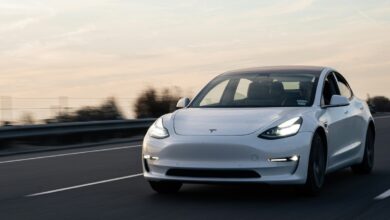Moody’s: Light-Vehicle Sales to Grow Amid U.S. Tariff Threat
Moody’s outlook for light-vehicle sales remains stable as overall demand holds steady.
“We are maintaining a stable outlook on the global automotive manufacturing industry, based on our expectations for steady demand across key regions,” the ratings firm stated in a news release. “We expect global light vehicle sales to grow 1.5 percent this year and 1.3 percent in 2019. While year-to-date sales support our full-year 2018 forecast, we see greater risks emerging that could hurt sales next year, including ongoing trade and tariff disputes, rising interest rates and higher fuel prices.”
Tariffs
U.S. light-vehicle sales will extend a recent slide amid rising interest rates, higher vehicle prices and the threat of tariffs on auto imports, prompting consumers to consider a used car or delay a vehicle purchase, according to the ratings firm.
“Next year is shaping up to be more challenging for auto manufacturers than 2018, amid lingering trade disputes, monetary tightening and rising fuel costs,” according to the Moody’s release. “Recent profit warnings from leading carmakers suggest that the sector will be contending with the prospect of greater downside risk in the year ahead. The automotive sector is still highly cyclical and the operating environment could deteriorate quite rapidly, due to such factors as new import tariffs or rising commodity costs.”
Foremost among the risks facing the sector is the Trump administration’s proposal to impose a 25 percent tariff on imports of automobiles and auto parts, according to Moody’s. Such a tariff would be broadly credit negative for automakers. Should any tariffs be levied, carmakers would have to absorb the added costs to protect sales volumes at the cost of profitability and/or pass a portion of the tariff costs to customers, potentially hurting sales.
A U.S. tariff on auto imports would exert considerable pressure on the operating margins of Japanese automakers, according to Moody’s. In August, Toyota Motor Corporation warned that a 25 percent U.S. import tariff would add about $6,000 to the cost of each vehicle it sells in the U.S.
Korean automakers Hyundai Motor Co. and Kia Motors Corp. have assembly plants in the U.S., but that production is insufficient to cover local sales, according to Moody’s. Of the vehicles they sell in the U.S., Hyundai imports about 40-50 percent and Kia imports about 60-70 percent, mostly from Korea and, to a lesser extent, Mexico.
Both companies plan to increase local production of SUVs and crossovers in the U.S. over the next two years. In addition, the companies can reduce exports from the U.S. to Canada or other regions to maximize sales of locally produced vehicles in the U.S., if tariffs are imposed. However, these efforts will be insufficient to fully offset the potential hit to their profitability, according to Moody’s.
Among European carmakers, the hardest hit would be those like Jaguar Land Rover Automotive Plc that lack a sizable U.S. manufacturing presence and must import all (or a substantial proportion) of the vehicles they sell in the U.S., mainly from Europe and, to a lesser degree, from Mexico and other markets, according to Moody’s.
While Fiat Chrysler Automobiles N.V. operates a large number of U.S. factories, it still imports about half of the vehicles in sells in the U.S., mostly from Mexico and Canada.
The impact would be more modest for Volkswagen AG, Daimler AG and BMW. While the three companies import around 50-80 percent of the vehicles they sell in the U.S. from other countries, these imports represent only 3 percent of VW group unit sales, 8 percent of Daimler’s sales and about 12 percent of BMW’s sales, according to Moody’s.
A U.S. import tariff could also hurt Ford Motor Company and General Motors Company, which import 20 percent and 30 percent their vehicles, respectively from Mexico and/or Canada. A 25 percent tariff could compel Ford and GM to initially subsidize vehicles imported into the U.S., according to Moody’s, and eventually shift production back to the U.S. But the net effect will not be clear until after the conclusion of negotiations to strike a new deal on NAFTA.
Emissions Regulations
A continued shift to stricter emissions regulation may also pressure margins and cash flows, according to Moody’s. Auto manufacturers will continue to face mounting environmental policy pressures, which will likely lead to stricter emissions-reducing regulatory targets, rising pressure on margins and cash flows, changing consumer preferences and technological disruptions.
“Automaker R&D and capital spending may need to increase amid the global push to reduce emissions and likely emergence of new competitors, such as alternative fuel vehicles,” according to Moody’s. “Financially strong companies will be best positioned to manage the added drain on their resources. But increased spending will likely put further pressure on the sector’s already low margins.”
Around The World
China growth will offset declining U.S. sales, according to Moody’s.
“Steady auto sales in China are a key driver of our global forecast, but growth will remain far more modest than the double-digit percentage gains seen as recently as 2016,” according to the firm. “We expect auto sales in China to grow 2 percent this year, slowing from 3 percent in 2017. Chinese sales growth should improve to 2.5 percent in 2019.”
Car sales in Japan are on track to finish 2018 with a 0.1% increase, slowing sharply from a 5.3 percent gain in 2017, with growth to recover somewhat to 1.3 percent in 2019, according to Moody’s.
The ratings firm expects Western European sales growth to slow in 2019.
“We expect Western Europe light-vehicle sales to grow 2 percent in 2018 before slowing to 0.5 percent in 2019,” Moody’s stated in a news release. “We expect sales in the region to reach 16.6 million next year, by which time Germany, France and the U.K. will have reached or exceeded their prior peak in demand from the last sales cycle. Thus, we expect that further upside would be limited.”
Economic growth is set to support sales gains in key emerging markets, according to Moody’s.
“Consumer demand for new cars will remain strong in India and will continue to rebound in Brazil and Russia, buoyed by improving macroeconomic fundamentals,” according to the ratings firm. “We expect continued low single-digit GDP growth in Brazil and Russia through 2019, while India’s economy is likely to grow in excess of 7 percent during the same period.



